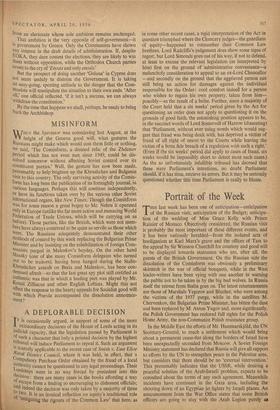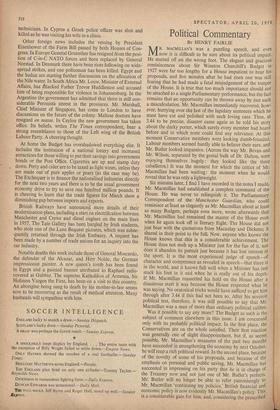Portrait of the Week
rrIns last week has been one of anticipation—anticipation 1 of the Russian visit; anticipation of the Budget; anticipa- tion of the wedding of Miss Grace Kelly with Prince Rainier of Monaco. Objectively considered, the Russian visit is probably the most important of these different events, and it has been variously heralded—from the isolated acts of hooliganism at Karl Marx's grave and the offices of Tass to the appeal by Sir Winston Churchill for courtesy and good will to be displayed towards statesmen who are, after all. the guests of the British Government. On the Russian side the dissolution of the Cominform was obviously a preliminary skirmish in the war of official bouquets, while in the West leader-writers have been vying with one another in warning the public not to be taken in by the big bad wolves. In Rtissia itself the retreat from Stalin goes on. The latest reinstatements are those of Marshals Yegorov and Blucher, who were among the victims of the 1937 purge, while in the satellites M. Chervenkov, the Bulgarian Prime Minister, has bitten the dust and been replaced by M. Anton Yugov and, more significantly, the Polish Government has restored full rights for the Polish Home Army, the non-Communist Polish resistance group.
In the Middle East the efforts of Mr. Hammarskjiild, the UN Secretary-General, to reach a settlement which would bring about a permanent cease-fire along the borders of Israel have been unexpectedly seconded from Moscow. A Soviet Foreign Ministry statement has declared that Russia will give all support to efforts by the UN to strengthen peace in the Palestine area, but considers that there should be no 'external intervention.' This presumably indicates that the USSR, while desiring a peaceful solution of the Arab-Israeli problem, expects to be consulted about the terms of any such agreement. Meanwhile incidents have continued in the Gaza area, including the shooting down of an Egyptian jet fighter by Israeli planes. An announcement from the War Office states that some British officers are going to stay with the Arab Legion purely u technicians. In Cyprus a Greek police officer was shot and killed as he was visiting his wife in a clinic.
Other foreign news includes the vetoing by President Eisenhower of the Farm Bill passed by both Houses of Con- gress. In Europe General Gruenther has resigned from the posi- tion of C-in-C NATO forces and been replaced by General Norstad. In Denmark there have been riots following on wide- spread strikes, and one policeman has been killed. Egypt and the Sudan are starting further discussions on the allocation of the Nile water. In South Africa Mr. Louw, Minister of External Affairs, has t ttacked Father Trevor Huddleston and accused him of being responsible for violence in Johannesburg. In the Argentine the government has admitted that there is still con- siderable Peronista unrest in the provinces. Mr. Marshall, Chief Minister of Singapore, has come to London to have discussions on the future of the colony. Maltese doctors have resigned en masse. In Ceylon the new government has taken office. Its beliefs, writes The Times correspondent, bear a strong resemblance to those of the Left wing of the British Labour Party. A cheering thought.
At home the Budget has overshadowed everything else. It includes the institution of a national lottery and increased attractions for those willing to put their savings into government bonds or the Post Office. Cigarettes are up and stamp duty down. Perry and cider are to be taxed as light wines, unless they are made out of pure apples or pears' (as the case may be). The Exchequer is to finance the nationalised industries directly for the next two years and there is to be the usual government economy drive to try to save one hundred million pounds. It is cheering to learn that the trade figures for March show a diminishing gap between imports and exports.
British Railways have announced more details of their modernisation plans, including a start on electrification between Manchester and Crewe and diesel engines on the main lines in 1957. The Tate Gallery has been burgled by Irish students, who stole one of the Lane Bequest pictures, which was subse- quently returned through the Irish Embassy. A request has been made by a number of trade unions for an inquiry into the car industry.
Notable deaths this week include those of General Moscardo, the defender of the Alcazar, and Herr Nolde, the German impressionist painter. A new queen's tomb has been found in Egypt and a painted banner attributed to Raphael redis- covered at Gubbio. The supreme Katholikos of Armenia, his Holiness Vazgen the First, has been on a visit to this country. An aborigine being sung to death by his mother-in-law seems now to be recovering as the result of medical attention. Many husbands will sympathise with him.



















































 Previous page
Previous page